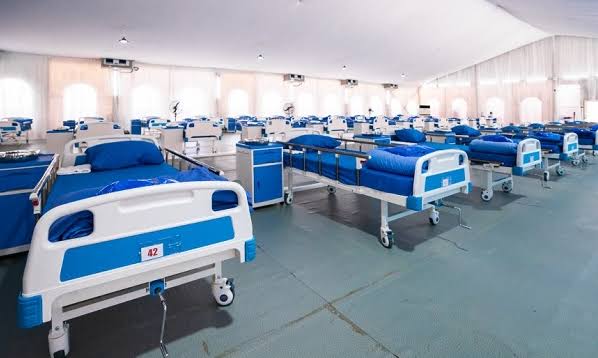Lagos, Nigeria
Healthcare services across Lagos State, Nigeria’s most populous city, have been thrown into disarray as doctors employed by the state government embarked on a three-day warning strike.
The industrial action, which commenced on Monday, July 28, 2025, and is expected to run until Thursday, July 31, has caused significant disruption, leaving thousands of patients stranded and highlighting the persistent grievances over salary deductions and unpaid arrears.
The strike, spearheaded by the Medical Guild, the umbrella body for medical and dental practitioners in the employ of the Lagos State Government, comes after what the doctors describe as “illegal and disrespectful” salary deductions in July and the lingering non-payment of 12 months’ revised Consolidated Medical Salary Structure (CONMESS) arrears owed to honorary consultants at the Lagos State University Teaching Hospital (LASUTH).

The Genesis of the Crisis: A Cycle of Broken Promises
According to Dr. Japhet Olugbogi, Chairman of the Medical Guild, the current dispute traces back to April 2025, when the state government unilaterally implemented salary deductions affecting all medical and dental practitioners. While these deductions were reportedly reversed after initial protests and engagements, the Guild was “shocked” to find a fresh round of deductions in their July salaries, this time without prior notice or explanation.
ALSO READ: https://nationscuriosity.com/nigeria-on-high-alert-ncdc-battles-multiple/
The doctors lament that despite repeated attempts at dialogue and the establishment of a conciliation committee to address outstanding issues, the government has consistently failed to honor agreements. Dr. Olugbogi highlighted the dire financial situation of doctors in the state, stating that “the most senior doctor in Lagos State employment does not earn up to $1,100,” making the recent deductions particularly painful amidst the prevailing economic hardship.
Beyond the immediate July deductions, a major sticking point remains the 12-month arrears of the revised CONMESS owed to honorary consultants at LASUTH. The Guild views these unresolved discrepancies as a breach of trust and a disregard for the welfare of their members.
Impact on Healthcare Services: Patients Bear the Brunt
The immediate consequence of the strike has been a crippling blow to public healthcare services across Lagos. Major hospitals like the Lagos State University Teaching Hospital (LASUTH) in Ikeja, usually bustling with activity, have been reduced to skeletal services. Wards are empty, consulting rooms are locked, and many departments are non-functional.
Patients, many of whom had scheduled appointments, have been forced to return home, their hopes of receiving timely medical attention dashed. Reports from various hospitals, including Isolo General Hospital and Igando General Hospital, indicate similar scenarios of disruption and patient frustration. Surgeries have been halted, and new patients are reportedly being turned away, with only critically admitted patients receiving limited attention.
The ripple effect extends beyond immediate medical care. The disruption creates a backlog of patients, exacerbates existing health conditions, and puts vulnerable individuals at increased risk. The NCDC’s recent alert on multiple disease outbreaks further underscores the precariousness of the situation, as a crippled healthcare system is ill-equipped to handle potential surges in cases.
Government’s Response and the Path Forward
In response to the strike, the Lagos State Government, through its Ministry of Health, has appealed to the Medical Guild to suspend the industrial action, assuring the public that “all grievances are being looked into with utmost sincerity and urgency.” The government maintains that negotiations and engagements with the Medical Guild are ongoing and has activated contingency plans to minimize the impact on healthcare delivery. However, on-the-ground reports suggest these plans have not significantly bridged the gap created by the absence of doctors.
The Medical Guild, backed by the Lagos State chapter of the Nigerian Medical Association (NMA), has warned of escalation if their demands are not met. They have resolved to issue a 21-day ultimatum to the state government after the warning strike. If the demands remain unmet at the expiration of this ultimatum, an indefinite strike will commence, further deepening the crisis in the state’s health sector.
A Plea for Resolution and Sustainable Healthcare
The Lagos doctors’ strike is a stark reminder of the chronic challenges plaguing Nigeria’s healthcare system – inadequate funding, poor working conditions, and recurrent disputes over remuneration. While doctors’ demands for fair wages and improved welfare are legitimate, the frequent industrial actions invariably place the burden on the already vulnerable populace.
For Lagos, a megacity with an ever-growing population, a robust and functional healthcare system is not a luxury but a necessity. The current impasse calls for urgent and decisive intervention from the state government. A sustainable solution requires not just a reversal of the recent deductions and payment of arrears, but also a comprehensive review of doctors’ welfare packages, transparent communication, and a commitment to honoring agreements.
The well-being of millions of Lagos residents hangs in the balance. All stakeholders must prioritize dialogue and reach a lasting resolution that ensures the continuous provision of essential healthcare services and prevents further disruptions that jeopardize lives. The time for genuine commitment to the health sector is now.

